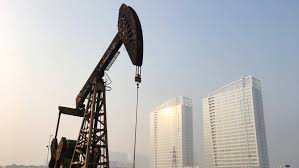Global Markets: Oil above $80 lifts stocks, offsets trade and bond market chill

LONDON (Reuters) – European shares rose and Wall Street was set for a stronger open on Tuesday, as oil above $ 80 a barrel lifted energy shares, despite worries around the latest U.S.-China tariff round and central bank rate hikes.
Following falls across Asian share markets, European bourses turned higher, with a pan-European index up 0.5 percent. Futures for New York’s S&P500, Nasdaq and Dow Jones indices were up to 0.25 percent higher, indicating a stronger session following Monday’s falls.
MSCI’s main index of world stocks also inched into positive territory, though it held off the six-month highs hit earlier this month.
While trade tensions continue to fray investors’ nerves, oil grabbed the spotlight. After surging more than three percent on Monday, Brent crude futures shot to four-year highs of almost $ 82 a barrel.
The jump was down to U.S. sanctions on Iranian crude exports and the apparent reluctance of OPEC and Russia to counterbalance that by upping output.
“The combination of tight supply, healthy demand, falling global inventories – down from already under-stored levels – and anemic spare capacity helps support an oil price which could end the year above $ 90,” Richard Robinson, manager of Ashburton’s Global Energy Fund, said.
While oil’s rise will fan inflation and growth concerns in many countries, it boosted European equities – an index of oil and gas shares rose 1.5 percent to its highest since May. In the UK, energy heavyweights Shell and BP jumped 2-2.5 percent to lift the FTSE index 0.5 percent.
Pre-market trades indicated U.S. giant ExxonMobil was set to open 0.6 percent higher.
But the rise in energy shares failed to dent broader market pessimism after new tariffs imposed by Beijing and Washington on each other’s goods kicked in on Monday and Chinese Vice Commerce Minister Wang Shouwen accused the United States of putting “a knife to China’s neck”.
Neither side appears ready for compromise, worrying investors that the conflict is fast-becoming a protracted battle that will chill investment and hurt global trade.
“Markets have tried hard to shrug off the implications of an escalating trade spat on global trade and growth but this is becoming harder with each fresh round of tariffs and will slowly but surely take its toll on investor sentiment,” Jasper Lawler, head of Research at London Capital Group, said.
There are other big worries for investors too, not least the timing and pace of central bank policy tightening.
While the U.S. Federal Reserve will almost certainly hike rates for a third time in 2018 this week, European Central Bank President Mario Draghi on Monday raised expectations the euro zone will also start to normalise policy over the coming year by referring to “relatively vigorous” underlying inflation and brisk wage growth.
That pushed German 10-year bond yields to four-month highs above 0.5 percent, while yields also rose across the euro bloc with money markets now pricing a rate rise by the ECB next September. That’s a marked change from a few weeks ago when a move was only expected by December 2019.
The outlier was Italy, where yields dropped sharply on signs the government is not planning a huge budget deficit that could raise its debt levels.
U.S. 10-year Treasury yields touched a new four-month high above 3.10 percent.
Goldman Sachs analysts noted a change in how markets were viewing rising bond yields – having considered them a signal of improving growth and hence a positive for equities, higher bond yields were becoming attractive in their own right, they said.
“With U.S. 10-year bond yield above 3 percent and U.S. real yields close to 1 percent, the risk especially to equities from rates is now back in focus,” they told clients in a note.
“We think the bar for investing in risky assets is rising as returns on safer assets are becoming more attractive.”
Currency markets were mostly quiet as investors watched from the sidelines before the Fed meeting.
The euro strengthened 0.3 percent to around $ 1.178 after rising above $ 1.18 following Draghi’s inflation comments, while sterling too rose 0.3 percent, up for the second straight day on hopes Britain will eventually clinch a last-minute deal before exiting the European Union next March.
The dollar slipped 0.12 percent , but stayed above two-month lows hit at the end of last week.
The dollar’s three percent drop since mid-August has given some respite to emerging markets in recent days but MSCI’s emerging equity index slipped 0.2 percent, while most emerging currencies also weakened, anticipating a hawkish tone from the Fed.
Additional reporting by Helen Reid in LONDON and Shinichi Saoshiro in TOKYO; Editing by Andrew Heavens
